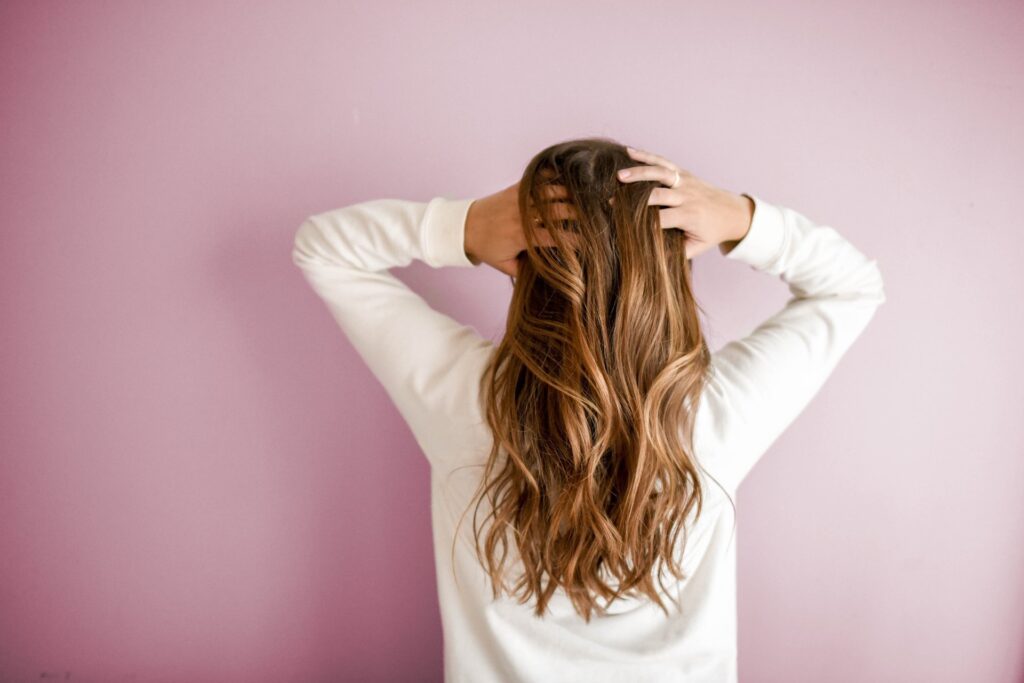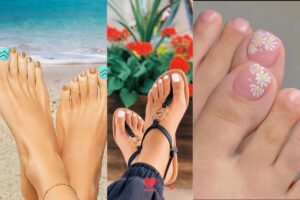Can vitamin deficiencies cause hair loss? Well, let’s see!
It’s happening. You see more hair stuck in your brush, clogged in the drain, and fanned out on the floor than before. The worst part is when your scalp starts peeking through the hair. And you’re probably thinking – WHY ME? 😥 While you tend to blame your shampoo or weather etc. for the hair loss. The reason for the excessive hair fall, more often than not, is an issue pertaining to what’s happening inside your body. ‘You are what you eat’ always holds true.
Some of the most common causes of hair loss include genetics, aging, poor diet, stress, dandruff, scalp conditions, childbirth, tight hairstyles, and nutritional deficiencies.
Our hair needs nutrients to thrive, grow and be healthy. While most of us get our daily nutrients from the regular diet, some vitamins are more prone to lack in the human body than others. And some of them can lead to hair loss in women.
If you’ve noticed your hair falling out more than usual and is thinning out, here are the 5 most common vitamin deficiencies that can cause hair loss in women.
Vitamin Deficiencies That Cause Hair Loss!
1. Vitamin B12 Deficiency Can Lead To Hair Fall
Vitamin B12 is a water-soluble vitamin that helps in the production of oxygen-rich red blood cells. These cells feed your hair follicles. As opposed to your hair strand, your hair follicles are very much alive. So you don’t feel anything during a haircut, but the same isn’t true for when you pull your hair out of the roots.
The follicle gets all its nutrients to multiply and grow from the papilla, the base of the follicle. Papilla has blood vessels through which they supply oxygen & nutrients to follicles. As B12 makes red blood cells, a deficiency can cause the hair to fall out and also prevent new hair strands from growing.
This can lead to hair loss and hair thinning!
Apart from hair loss, vitamin B12 deficiency is also linked to premature gray hair. So if you’ve been noticing white hair along with hair fall, here’s a clear-cut sign that you’re Vitamin B12 deficient.
Lack of B12 in your body can also make you feel tired, low on energy, anxious, and dizzy. Other symptoms include pale skin, mood changes, pins and needles, and disturbed vision.
How to treat Vitamin B12 deficiency?
Get yourself checked. Depending on the levels of B12 in your blood, your doctor will recommend an oral dosage of B12. Apart from supplements, you also need to eat foods that have an apt amount of B12. Only a limited number of foods are rich in these vitamins and there are no plant sources for B12. Foods that are rich in B12 include dairy, eggs, tuna, shrimp, sardines, chicken breast, liver, and clams. So if you are a vegetarian, only dairy and eggs are your source of B12. Vegans have to supplement daily or take a B12 injection regularly to meet their daily requirements
Also, those with Vitamin B12 deficiency are also highly likely to be iron deficient. This condition is called pernicious anemia. And brings us to the second deficiency that leads to hair loss.
Buy Vitamin B12 supplements here: Amazon.in || Amazon.com
2. Iron Vitamin Deficiency Can Cause Hair Loss
According to dermatologists, iron deficiency is the most common cause of hair loss in women. Iron aids in the production of red blood cells and hemoglobin. They help in carrying oxygen and nutrients to your body’s organs and tissues.
When your body lacks iron, hemoglobin will deliver oxygen and nutrients to the essential organs first. This means papilla, and your hair follicles won’t receive them. This leads to excessive hair fall and hair thinning. Studies suggest that iron deficiency can play a role in hair fall that’s similar to male pattern baldness. [1]
Other symptoms of iron deficiency include pale skin, breathlessness, cold hands and feet, dizziness, and extreme fatigue.
Do NOT take iron supplements without medical supervision, even if you’re iron deficient. Let your doctor prescribe you the supplement and treat the underlying cause if any. To increase the absorption of iron, pair it up with a Vitamin C supplement or Vitamin C-rich foods like orange juice, sweet lime juice, capsicum, papayas, guavas, and kiwis.
Indian foods that are iron-rich include halim seeds (halim water) (get it here), poha, murmure, sesame seeds, bajra flour, masoor daal, moong daal, chawli or black-eyed peas, and gram flour. Other iron-rich foods include red meat, poultry, seafood, dark leafy vegetables, beans, chia seeds, apricots, and raisins.
If your physician nods to the iron supplement, try one here with Vitamin C and other vitamins to help you absorb it better.
3. Vitamin D Deficiency Can Cause Hair Loss
Enjoying the quarantine time indoors? Even when you step out once in a while, you lather on the sunscreen. Then the cause of your hair loss is quite clear. It’s a Vitamin D deficiency. A study conducted in India found female patients with diffuse hair fall to have significantly low levels of Vitamin D. [2] Another research paper showed female pattern baldness linked to low levels of Vitamin D. [3] As if all of that wasn’t enough, Vitamin D has also been linked to alopecia. [4]
What’s the link between Vitamin D and hair loss? Vitamin D plays a critical role in natural follicle formation – stimulating hair growth as well as strengthening the existing follicles. It also maintains the hair life cycle and delays aging (premature greying). Lack of Vitamin D disturbs the hair follicle cycle and can lead to chronic female pattern hair loss.
How to up your Vitamin D levels?
- The best way to meet your daily Vitamin D requirement is sun exposure. Spend at least 15 to 30 minutes daily in the sun. Preferably during sunrise and sunset times, not during midday. Don’t put any sunscreen on, not even SPF 8. Make sure your bare skin is exposed to the sun. You can wear a tank top and shorts. Doing this will make sure you’ve enough Vitamin D levels.
- Consume foods rich in Vitamin D. This includes fish, mushrooms, fortified milk, fortified orange juice, eggs, and pork chops.
- For supplementation, please contact your doctor. To treat Vitamin D deficiency, doctors recommend 60,000 IU of vitamin once a week. Some daily supplements have around 100 to 200 IU of Vitamin D, which is an apt amount for a healthy individual.
Buy Vitamin D supplements here Amazon,in || Amazon.com
4. Biotin Vitamin Deficiency Can Cause Hair Loss
Biotin is the most touted solution for hair growth and reducing hair fall. It’s also the most scientifically backed vitamin that improves hair health. [5] Biotin is actually a kind of B vitamin that’s present in almost all hair vitamins and is strongly recommended by dermatologists. However, biotin only treats hair fall due to deficiency and isn’t an effective cure for male or female pattern baldness or hair fall occurring due to reasons like hormonal imbalance or childbirth.
So how does biotin help your hair? Biotin converts nutrients into energy. It plays a major role in rebuilding tissues and DNA repair. The vitamin significantly improves keratin infrastructure, which stimulates hair growth and makes them look more lustrous. Apart from hair, biotin can strengthen your nails as well and prevent them from breaking.
How to up your biotin levels?
- You can supplement with biotin. The most common dosage is 5 mg or 10 mg. Here’s a good ONLY biotin supplement you can purchase. Click here.
- As with all vitamins, natural sources are the best to fulfill your daily requirements. Some biotin-rich foods include beef, eggs, salmon, almonds, avocado, sunflower seeds, spinach, broccoli, cheese, sweet potatoes, oats, milk, and bananas.
See: 7 Biotin Supplements To Consume For Hair || Purchase here: Amazon.com
5. Folic Acid Deficiency Can Cause Hair Fall
Much of a pregnant woman’s pregnancy glow can be attributed to folic acid. The vitamin helps in healthy cell growth, which is super-important when you’re growing a baby inside you. Prenatal vitamins generally have a high amount of them. This is one of the precursors behind a pregnant woman’s healthy glow and shiny hair.
Folate also helps with the production of RBCs, which carry oxygen and nutrients to all parts of the body, including hair follicles. Without them, hair follicles can’t produce keratin, which is a building block of hair. Supplementing or increasing your intake of folic acid will promote hair growth [6] and can also prevent premature greying. [7]
How to ensure you have adequate folate in your body? Supplements? We wouldn’t recommend that. Like iron, the best way to up your folate levels is through diet. Supplements should only be taken as a doctor’s recommendation. Indian foods high in folic acid are chana, rajma, masoor dal, moong dal, fali, sesame seeds, and beetroot.
Buy folic acid supplements Amazon.in || Amazon.com
FAQ’s
What are the best vitamins for hair loss and hair growth?
For hair loss and hair growth, it’s recommended to supplement with biotin. But taking a multivitamin supplement (like this one here) is much more beneficial. Sometimes, it’s not possible to ensure you get all necessary vitamins & minerals through diet, and having a multivitamin daily is a safe way to make sure you don’t suffer from any deficiencies, and hence, hair loss.
What’s the most common vitamin deficiency that causes hair loss?
A deficiency in iron, Vitamin B 12, and Vitamin D are the most common causes of hair loss. You can get them checked if you’re experiencing sudden hair loss. Supplementing immediately can help prevent any further hair shedding out and even regrow lost hair.
Can too many vitamins cause hair loss?
Yes, any vitamin taken for too long, when the body doesn’t need it can cause hair loss. While any excess B vitamins (which includes B12 and Biotin) are excreted from the body and only what’s needed is absorbed, the same principle doesn’t apply to other vitamins. Some of the minerals are especially known to induce hair loss when taken in excess. These include Vitamin A, Vitamin E, Vitamin D, zinc, and selenium.
What vitamin deficiencies cause hair loss in females?
The most common vitamin deficiencies that cause hair loss in females are Vitamin B12, Iron, Vitamin D, Biotin, folate, and zinc. Excess hair loss is often because of what’s going inside your bodies than external factors. Hormonal imbalance and certain medical conditions can also cause hair loss. If you’re experiencing sudden hair fall, it’s best to consult a medical professional immediately so you can get to the bottom of the problem immediately.
Is vitamin deficiency-induced hair loss reversible?
Yes, any hair loss caused by Vitamin deficiency is reversible. It might take some time though and there’s no anecdotal evidence that draws a proper timeline. Some studies have shown that 2 months of supplementation leads to most of the hair growing back, but a significant amount of hair regrowth can take 6 months or longer.
Can Zinc deficiency cause hair loss?
Yes, zinc deficiency can cause hair loss and hair thinning. People do experience zinc deficiency, and it’s not as rare as we think. In our bodies, zinc ensures the immune system works efficiently. Further, the vitamin helps with cell growth, division, protein synthesis, and even helps maintain your sense of taste and smell. Because of its role in cell growth, zinc ensures an improved anagen phase (when the hair grows and cells in the root of the hair divide rapidly) of the hair growth cycle. And because of its role in protein synthesis, low zinc levels can reduce keratin, leading to hair breakage. Some research has linked zinc with male pattern baldness, and other research has shown that zinc inhibits 5 alpha-reductase, an enzyme that plays a role in producing DHT.
If you’re zinc-deficient, you’ll experience symptoms other than hair loss like decreased appetite, weight loss, slow wound healing, lack of alertness, decreased sense of taste & smell, and diarrhea. You can try these zinc supplements if you’re experiencing these signs. The good news is hair loss due to zinc deficiency is completely reversible. Don’t overdo the supplementation though, because too much zinc can also cause hair loss. High zinc levels can hinder the absorption of other minerals and cause hormonal imbalances.
Visit Your Doctor
For excessive hair loss, we’d advise a trip to the dermatologist as your first step. Most of them would be able to identify your deficiency with dietary habits and health history. Some might ask you to take tests before starting any supplementation.
The good news is most of the hair loss due to vitamin deficiency is reversible. You will see new hair growth within one month of taking the medicines. It will take time to grow to the original length but at least the daunting hair fall phase will be over.





